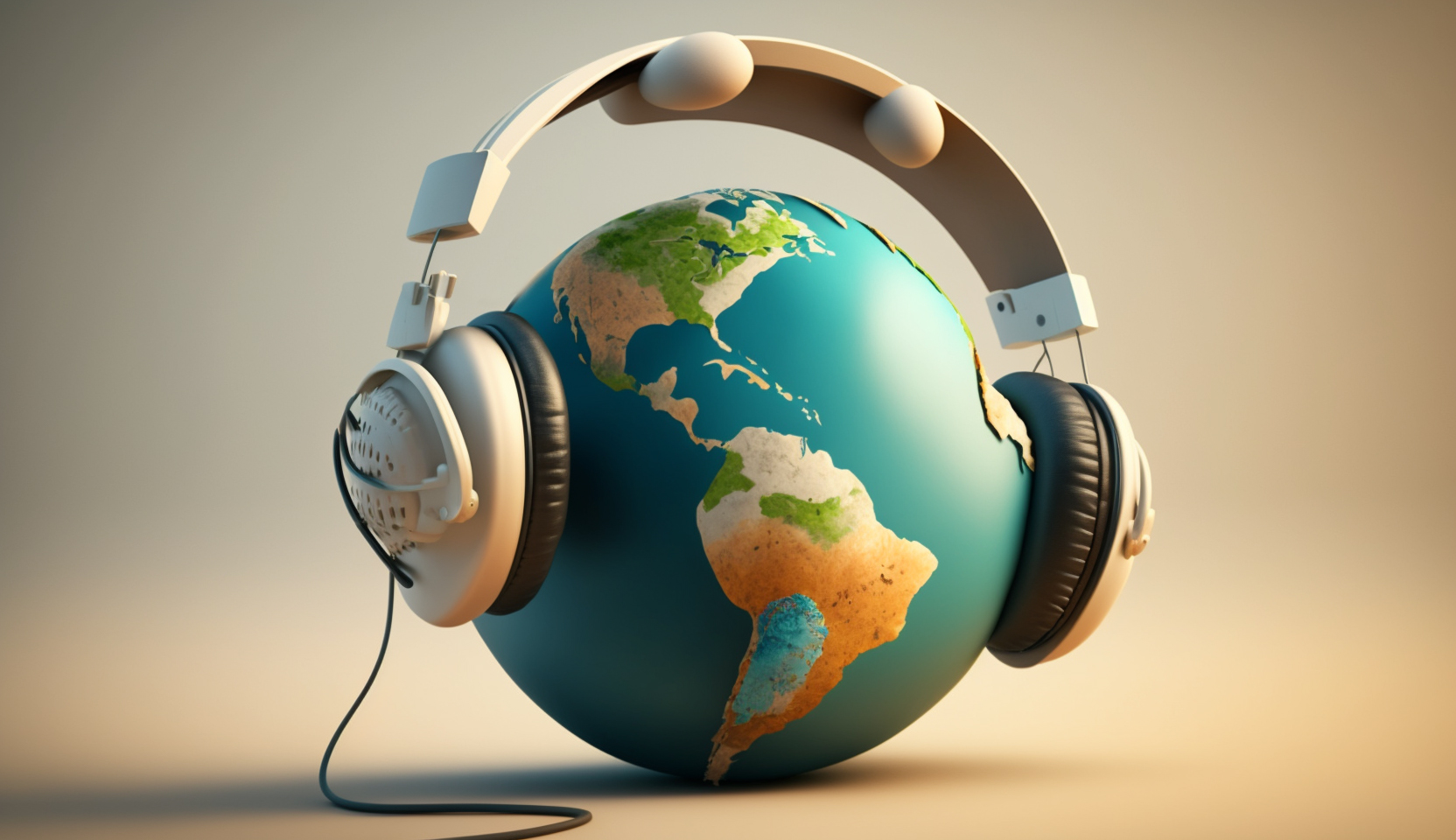Available now from Sounds Profitable and Signal Hill Insights: The Medium Moves the Message: a comparative study of the effects of advertising across AM/FM radio, television, and podcasting. Download the free deck now!
Recently, Otonal and Asahi Shimbun released their annual PODCAST REPORT IN JAPAN, a massive (10,000 person) study of Japanese consumers and their relationship with our favorite medium. Podcast listening there continues to lag behind what we have seen in several Western countries, with about 16% of the population 15+ listening at least monthly (in the US, according to the most recent Infinite Dial, that number with Americans 12+ is 42%).
Now, I’ve worked a little in Japan – certainly not enough that I would feel comfortable speculating on why podcasting is or is not catching on there, depending on how you read the fullness/emptiness of the glass. I spent a couple of weeks there years ago consulting a radio station that played everything from Smooth Jazz to Opera, and my brief time there was truly as much like visiting another planet as anything I have ever done. So much so that you won’t be seeing any hot takes here about the future of podcasting in Japan. I don’t know.
What this report does give us, though, is a glimpse into what listening looks like in a country where podcasting’s introduction to the masses was very different from how the medium grew here in the US. For many of podcasting’s first 20 years, it was not only a niche medium, but it was a niche tied to a distinct segment of the population: iPod and, later, iPhone users. And we aren’t talking about iPhone users circa 2022, but iPhone users in the early days – weirdos like me who were attending a conference in Minneapolis and ducked out in the afternoon to wait in a line at a random AT&T store to get the first one (I pulled this out recently, btw – WHAT A BRICK.)
In short, podcasting’s gestation in this country was largely tied to a segment of the population that did not profile in the middle of the bell curve. iPhone users, in particular, continue to have substantially different profiles in demographics and behaviors to Android users, and this was even more true ten years ago. I remember first asking questions like “Why do you listen to podcasts?” back in the late 2000s and commonly getting answers like “to listen to content I can’t get anywhere else.” Podcasting in America grew from a seed of people interested in Podcasting, the thing itself, and not for a specific show. I can’t tell you how many podcasts I had on my 100MB hard drives and 5MB iPods back then. Certainly more than I could possibly listen to.
Podcasting was introduced to a particular segment of American society in the mid-2000s, and it stayed there for quite some time. Even podcasting’s breakout “hit,” Serial, was catnip for that existing audience and not necessarily an entrée for the wider population. The very name podcasting itself held the medium back in immeasurable ways (dear cranky OGs reading this – yeah, yeah, I know. It’s the name we have.) What we know of podcasting today is a result of how it grew – not as a mainstream phenomenon, but as a decidedly left-of-center one.
The Japanese podcast listener, on the other hand, profiles extremely differently. Want to know what podcasting might have looked like in the US were it parachuted into mainstream awareness all at once, instead of drip-fed by way of Cupertino? Japan is your lab. That’s not to say that podcasting didn’t also start in Japan through the conduit of Apple, but it certainly didn’t get very big in Japan that way. Today, according to the Otonal/Asahi Shimbun report, nearly half of podcast listeners just started listening in the past year (that’s nearly half of that 16%) and less than 20% have been listening for more than four years. And unlike the early days of podcasting in the US, where listening was concentrated 30-44, podcast listening in Japan is young: 28% of monthly listeners are 15-29, and 57% are under 40.
Listening in the US didn’t start getting appreciably younger until Spotify made its mark in the medium, and a whole cohort of 13-29s were exposed to podcasts in ways they had never been before. In Japan, Spotify is even more important to podcasting, with 42% of 15+ using the service to listen to podcasts, compared to 22% who use Apple. Just as in the US, there is a tremendous opportunity for podcasting with the older audience, but the path there may be even less clear, given Spotify’s demographics.
So what does podcasting look like in a country where to a large degree, it was introduced to the mainstream public and not to a narrow segment? Simple: it’s defined by how people use podcasts and not by fans of podcasting itself. Exhibit A: the top genre for podcasts in Japan is News, while “Incident/Crime” is way down there at number 17. “Learning English” is the number six genre. And Business is number four. All of these differences from the US rankings speak to a much more utilitarian use for podcasts – not, “I need a new podcast to listen to,” but “I need to learn English/catch the headlines/etc.” It’s a means to an end, and not the end itself. There is no better evidence of this than the number one reason the sample lists for getting into podcasts: “I can now listen on music apps such as Spotify and Amazon Music.” Like they say in the NBA, there is no better ability than availability.
The top reasons for listening to podcasts include entertainment/relaxation, but also (intriguingly) “to enjoy content with ears only,” which some podcast network should adopt as their tagline immediately. I was particularly interested in the reasons why people started listening to podcasts that grew year-over-year from last year’s report. Among the gainers: “Because the media was introducing its own podcast show,” “the content of other voice services had become a podcast,” “I read newspaper/magazine articles,” and “I saw the information on television.” That’s right: some of podcasting’s biggest gains in Japan are from hearing about podcasts on other media. We are so focused on word of mouth and recommendations here, which of course are important, but not focused enough on using other media to talk about podcasts (and I am not talking here about the “easy button” of social media).
I think it’s instructive to look at how podcasting has grown organically in Japan and consider how we could use those lessons here in the US (or wherever you are reading this in English). For some, their introduction to podcasting is going to be “the show,” whether that is Rogan or new Spotify champ Brain Leak. But for millions more, it could be a very utilitarian introduction – simply a more convenient way to get the content they already like, or as a companion to some other content. Podcasting for what it does, and not for something more intrinsic.
This, I think, is the biggest disconnect between podcasting’s ambassadors in this country and the next wave of people that we need to reach. Podcasting in America was born of dissatisfaction. It was a rebellion against what was commercially available, led by the underserved. As it has spread to countries like Japan, it is being introduced to population segments that are currently satisfied by their content offerings, and this requires a different strategy, one that emphasizes the utility and convenience of podcasting, and not (exclusively, at least) its “uniqueness.”
And that kind of thinking might be the key to unlock new audiences here in the US. The mainstream 55+ audience, for example, has yet to really adopt podcasting primarily because they are relatively happy with what they are getting from radio and other audio outlets. So while I’d love to sell my dad on Lore, or The Moth, the better bet might be to position podcasting as the way to listen to what you already know and like, except when you want to listen to it. The White Vault can come later.
It’s not the most glamorous way to market podcasting. But you know what? Podcasting hasn’t tried to market itself in this way at any scale. Maybe it’s time to change that.
(Do download the report yourself – it’s fascinating, sound data.)
New Partners
Sounds Profitable exists thanks to the continued support of our amazing partners. Monthly consulting, free tickets to our quarterly events, partner-only webinars, and access to our 500+ person slack channel are all benefits of partnering Sounds Profitable.
- Ossa is an inclusive advertising marketplace that connects brands with female audiences. Their technology-driven approach helps you reduce the time and cost required to find and buy effective, data-driven podcast advertising campaigns.
- AdTonos is an innovation-driven ad exchange and marketplace monetising podcast, audiobook, gaming, music and radio streams.
Want to learn more about partnership? Hit reply or send us an email!



















































































































































































































